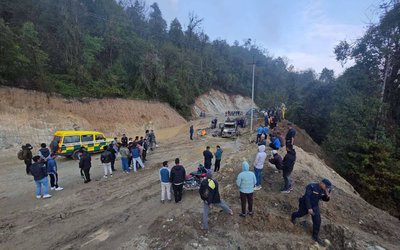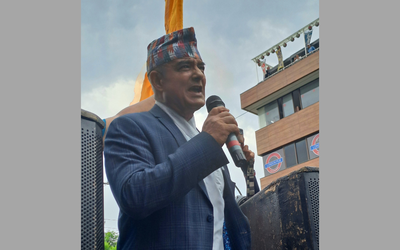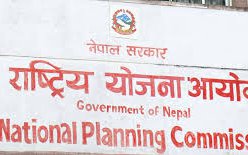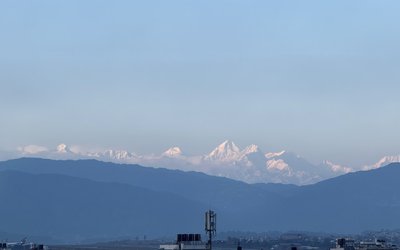
At 92, Himalaya Sumsher Rana, the first finance secretary and first governor of Nepal Rashtra Bank, still keeps himself busy and engages in social and civil society activities while serving the nation. He attends receptions, meetings of civil society organizations and engages in interactions on economic agenda.
Retired 41 years ago, Himalaya Sumsher Rana, who has a family of twenty-three members -- sons, daughters, daughter in laws, son in laws, grandchildren and great grand children -- still feels very enthusiastic to engage in the activities organized by civil service, civil society organizations and professional organizations. He used to play Golf till last year.
Despite spending more time in civil society work, Rana has a great personal attachment with civil service institutions, particularly Ministry of Finance, where he spent his early career to lay its foundation.

Although none of his family members are now in regular civil service, his sons and daughters have been serving the country in different capacities. His elder daughter Pratima Pande has been in heritage conservation and promotion of Nepal's legacy and identity, getting involved in institutions like Nepal Britain Society and Honorary Consul General of Italy. Similarly, his elder son Ashoke Rana has been in financial sector serving the country as the CEO of Himalayan Bank, a reputed bank of Nepal.
Another daughter Sangeeta Thapa is an established name globally for her contributions to promote Nepal's art. Director and Curator of Siddhartha Art Gallery, Thapa is branding Nepalese art globally. His younger son Amar Rana, who worked almost a year in Nepal TV, has been contributing through his own work.
Born in an aristocratic family, Rana, a great great grandson of liberal Rana Prime Minister Dev Sumsher, inherits many of his great-great grand father's character and legacy. He is humble as ordinary citizen, like his grandfather, who had declared himself to be a servant of people.
Grown up in liberal family environment, Rana did not find difficulty to adjust in a new system even after 2007. As most of other Ranas, he was also given higher position just after birth, making him different than ordinary citizen. But Himalaya Sumsher sided with the commoners in 2007, signing in a document in India demanding liberal system in Nepal. One can see the impact of education and his liberal views in his entire career.
Young, educated and liberal minded, Rana started to institutionalize Nepal's modern civil service, recruiting new employees on the basis of merit and individual competitiveness. Although none of his family members is now serving the institution he has created, Rana's affections to the institution is still in the core of his mind.
Junior civil servants of government of Nepal also see him as a legendary guardian. A few years ago, he was honored on Civil Service Day by his new and young colleagues recognizing his contributions. "He was our legendary figure in all aspects. Civil servants in Ministry of Finance see him as a family member because he had shaped the current finance ministry," said a recently retired finance secretary.

As Civil Servants around the country are celebrating Civil Service Day on September 8, Rana has been been watching closely whether young civil servants and their spirit will make the institution transparent, accountable, efficient and zero- tolerant to corruption.
Five Systems
Nepal has passed through five different political systems, six constitutions and regimes from Rana to democracy, active monarchy to constitutional monarchy and now federal republic. But what Nepal was unable to do was to institutionalize civil service to make it free of corruption, efficient and accountable.
Whoever comes to power, the first step a politician takes is to rock it. Just last fortnight, 21 secretaries were transferred without showing their weakness and drawbacks. Seasoned bureaucrat Rana has been an eyewitness to all these developments.
"Six constitutions and five systems, but stability is yet to be achieved. Even today civil service is facing another phase of instability," narrates Rana. Similarly, he is so concerned about the functioning of the civil servants where corruption and inefficiency are rampant.
"There is a tendency to block the files and create several hurdles. Civil servants should work as a facilitator rather as a boss or trouble maker," said Rana.
Selection of Employees
When Ministry of Finance was set up, the first challenges for Finance Minister Subarna Sumsher was to find a secretary with at least a master’s degree in economics. He scoured the Kathmandu elites for candidates who had master’s degree in economics or commerce to fill the posts in the ministry.

"Lila Prasad Lohani, Parikshit Narshing Rana and myself who had MA degree in economics and Krishna Raj Rajbhandari, who had an MA degree in commerce, were drafted to work in the ministry. Two months later, on the basis of the evaluation of performance exercised by the Finance Minister, I was appointed the first finance secretary by the government," said Rana.
As Rana regime kept its income-expenditure secret, I had to start everything from scratch. As finance secretary, I actively participated in drafting the annual budget of the government and making it public.
"I was responsible for safeguarding national Bhadarkhal Treasury, supervising Mulukikhana, where country’s entire revenue used to be deposited and issuing disbarment orders to Kaushi Toshakhana for government expenditure and ensuring the registration office functioned smoothly," said Rana.
"I had yet another challenge to face: curbing corruption in government office that had become necessary. I issued directives to all offices under my ministry to make the government’s income and expenditure transparent and established the office of the Accountant General to record and monitor the government’s revenue and expenditure."
"I achieved significant success in the hard work of modernizing the centuries old fiscal system of the country."
Directing custom offices and land revenue offices across the country and collecting revenue systematically also fell on my responsibility. In my capacity as a finance secretary, I was also appointed Director General of Nepal Bank Ltd and chairman of the board of directors.

I was twenty-five years old then. Appointments to such top posts at such a young age were and are rare.
Retired from regular work decades ago, Rana has been active in day to day life. Playing golf, attending different kinds of social meeting, interacting with professional groups, institutions, Rana, founder of Himalayan Bank, the first private commercial bank launched by Nepali, does spare quite a good time with family as well.
"Many successive generations retired from the service which Rana and his few colleagues had started from Lalita Niwas, the palace of late Subarna Sumsher Rana, in 1951 after revolution. However, the competence of civil servants working in Finance Ministry is still higher," said Rana.
Although Ministry of Finance has already been expanded extensively up to the grass root recruiting thousands of younger civil servants at tax department, custom department, Rana vividly remembered the early days when he had to start new revenue and custom offices.
Subarana Sumsher set up the Finance Ministry. During the Rana regime there was no department or office to look after the country’s financial and economic affairs. Subarna Sumsher was the first finance minister to present the country’s budget. He introduced the modern pay scale system for the government employees.
Later on the Ministry moved to Singh Durbar. I started to work as finance secretary from Lalita Niwas, house of Subarna Sumsher Rana.
Finance Ministry
During my first five-year tenure as a secretary, I devoted the first four years of my tenure to organizing the finance ministry from scratch and instituting a system of public finance according to democratic norms. I spent the fifth year on studies and observation of the financial institutions in a number of countries.

During the Rana period, Khardars, Subbas, Sardars and Kazis were appointed to assist Ranas for government posts. Following the Rana era, secretaries, deputy secretaries and assistant secretaries were appointed.
The total income of 2007 BS was Rs.29.081 million, expenditure was Rs.24.627 million and savings were Rs.4.394 million. Because of the previous year’s agitation and instability, the entry of total savings also could not be affirmed. But efforts were made to maintain the account through the Accountant General.
In the budget of 2008, the income and expenditure had been estimated at Rs.30.56 million and Rs.52.521 million respectively which means there is a deficit of Rs.22.05 million. Subarna Sumsher held the post from 1951-1953.
As governor, I actively participated in the Nepal-India bilateral talks on the trade and transit treaty which was signed in 1960. I was one of the members of delegation of foreign secretary Nara Pratap Thapa led delegation that finalized the treaty.
"Political change of 2007 came with many new institutions including modern bureaucracy. However, a new kind of Pajani replaced old Pajani of Rana period. Political instability badly ruined our civil service. Employees were completely deprived to use their conscience. They did not take decision on their own and waited for the order from top. They did more on individual benefits and no body considered the system.
"I was the first person to recruit civil servants through Public Service Commission. First selections were based on qualification and competence," said Rana. "Our civil servants are capable and knowledgeable compared to other employees of the region. What went wrong in the civil service is negativism. They are unable to use their knowledge. They have the tendency to hold the file and take decision on their own interest. Our level is very high but it is selfish and negative."
Looking at the large turnover of the employees between 2007 and 2014 BS, prime minister Tanka Prasad Acharya introduced civil service act to regularize the civil service and prevent instability. As the political leaders have the tendency to choose their own man, nothing has been working.

Journey of Rana
From Mohan Sumsher, Matrika Prasad Koirala, Tank Prasad Acharya, K.I Singh, Subarna Sumsher and B.P Koirala, Rana worked with eight Prime Ministers in his capacity as finance secretary in five years and governor in 3 years. "Prime Minister changed from time to time but I continued to enjoy stability in my tenure," recalled Rana.
From Rana's administrative structures, which had very few positions like Badahakim in Terai and hill with their responsibility to administer the areas, submit reports and collect revenue to Rana in Kathmandu, the change required for modern administrative institution was very different.
I was one of the two secretaries representing the government of Nepal in the three-member Administration Reform Committee headed by N.M. Buch, a highly regarded secretary from India.
I went abroad for 24 years following the coup d'état by King Mahendra in 1960. When I returned to Nepal after retiring from the UN service, Nepalese political leaders were somehow new for me. I was finance secretary from 1951-1956 and governor of Nepal Rashtra Bank from 1956 to 1959. I returned to Nepal at the end of February 1986 retiring from United Nations Service.
I spent a couple of years establishing and managing the Gurkha Brewery in partnership with local entrepreneurs and as a joint venture with a foreign brewery
Retired almost fifty years ago, Rana is an eyewitness of all the ups and downs and instability Nepalese Civil Service has been passing through.
There were 90000 and 40,000 pensioners. "We have too many employees. There is the need to restructure the service. The state is not in a position to pay regular pension from national treasury.”
During the Rana Period, Chiefsab looked after the administrative and financial transaction and Jangi Lath for military. Prime Minister used to take the final decision on both.
“After 2007 ministers came with ministries. Some institutions were there for education ministry and defense ministry. However, there were no institutions to deal with financial transaction as financial transaction remained secret during the Rana period. Thus, we had to start from a clean slate or scratch,” narrates Rana.
Rana's Vision
From a close and secretive system, the challenge to Rana was to turn government transaction open and transparent. Previously, there was a system to divide surplus money among Ranas and King. Managing the development budget was another major challenge for him.
"Ranas used to encourage government officials to spend minimum budget and make more savings. Those employees who spent less money got promoted and rewarded. Performance of the employees used to be taken on the basis of how more employees would come up with more surplus," shared Rana.
With the change, people's expectation also went up and the government also needed to spend more money in development sector. For more expenditure, there required more sources for revenue. The challenge was to shift main source of income from land revenue to elsewhere.
“We had decided to generate more revenue from import from India in the first phase. Rana's system used to collect the revenue through octroi like system with revenue based on volume of goods. However, we modernized the system opening duty free imports points in five more custom points. We modernized custom offices. We recruited people through public service commission to head custom post in Terai. We had established Excise Department, Tax Department and appointed the employees on the basis of their competitiveness," recalled Rana.
"During the Rana period, there was Kumari Chowk and they did not have accounting system. We revised accounting acts. We also had economic affairs department."
He recalled how poorly government employees were paid under Rana Administration. Monthly salary of peon was Rs. 9 and we increased it to Rs.30.00. "We revised the pay scale and introduced the time scale salary. In the beginning, we worked in ad-hoc. The salary of Secretary, Assistant Secretary and Under Secretary were made Rs.200. However, secretaries were given Rs.200.00 additional bonus and under secretary and Assistant secretary Rs.150. We had constituted Public Service Commission. The level of employees was high. There were over 100 employees as it is the largest ministry. Remittances were main sources of foreign exchange."
"There was no consumerism. So corruption was nominal. With the rise of consumerism, there also was an increase in the corruption related incidents. Going through everyday newspaper reports, it seems that our whole system is corrupt and inefficient," observed Rana.
There are demands of goods and services. However, Nepal is unable to produce enough products on its own. "Surviving on huge flow from remittances, Nepal's economy can face major crisis any day and any time," worried Rana.
"If the crisis like Straight of Gulf escalates, Nepal will have to face major economic crisis. If there is a decline in remittances, Nepal's economy can collapse," narrates Rana. Every one including the current finance minister and secretaries know that the crisis is looming at the horizon. However, no one is taking harsh step."
Nepal’s bureaucracy has transformed much but it is yet to get much needed stability. Nepal’s civil service faced a series of reshuffle from time to time which has ruined it completely. Even now at the state of restructuring, Nepal’s civil service is facing another jolt again.

As is said, age is no bar for those who want to contribute. This is what one can learn from the legend of Rana, the first and youngest finance secretary and governor of central bank, who has been living actively with the civility as a respected civil servant of Nepalese civil service.

Keshab Poudel
Poudel is the editor of New Spotlight Magazine.
- KUL MAN GHISING: Bowing Down To The People
- Apr 13, 2025
- POLITICAL VIOLENCE: Culture of Impunity
- Apr 11, 2025
- PM OLI MEETS PM MODI: No Progress
- Apr 09, 2025
- PM OLI’S THAILAND VISIT: Flip Flop
- Apr 08, 2025
- FM Dr. Deuba’s India Visit: Mission Aborted
- Mar 26, 2025















